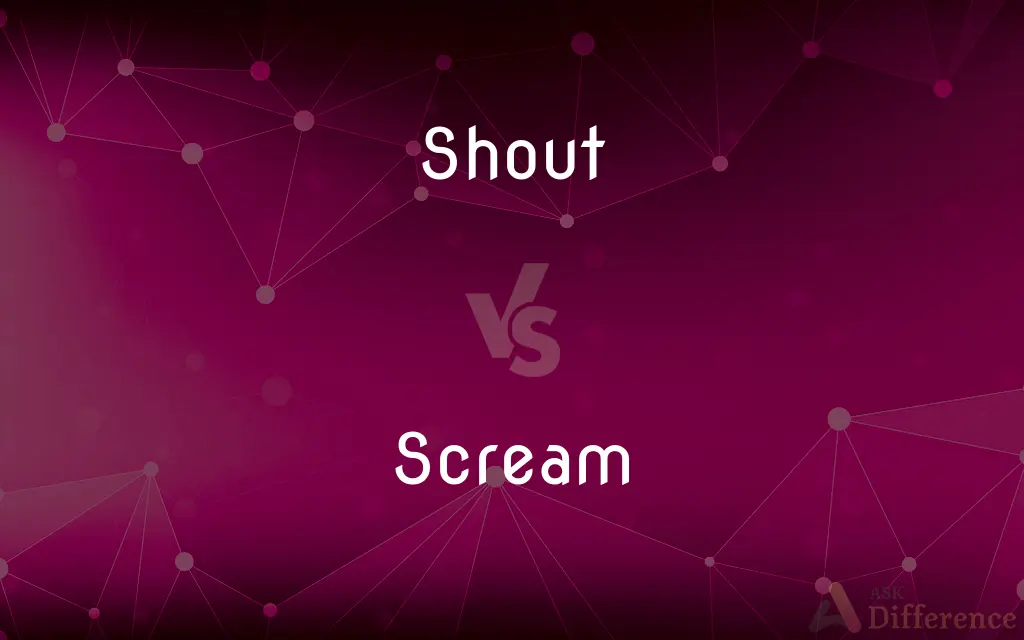Shout vs. Scream — What's the Difference?
Edited by Tayyaba Rehman — By Urooj Arif — Updated on April 15, 2024
Shout involves loudly calling or exclaiming to catch attention or express strong emotion; scream denotes a high-pitched, often startling cry driven by fear or extreme emotion.

Difference Between Shout and Scream
Table of Contents
ADVERTISEMENT
Key Differences
Shouting is typically used to project one's voice over a distance or over ambient noise, emphasizing volume and clarity. Whereas, screaming involves a higher pitch and intensity, often indicating alarm or distress.
In social and communication contexts, shouting can be strategic, such as in sports or group settings to motivate or coordinate. On the other hand, screaming is generally more spontaneous and is associated with an involuntary response to sudden emotions or pain.
The physical act of shouting uses strong vocal projection and can be sustained over a longer duration. In contrast, screaming is usually a burst of sound, potentially straining the vocal cords more acutely due to its high pitch and intensity.
Culturally, shouting can have various perceptions, from assertive communication to rudeness, depending on the context and tone used. Conversely, screaming is almost universally associated with emergencies or extreme excitement, requiring immediate attention.
In media and entertainment, shouting is often portrayed as a form of powerful speech or argument, while screaming is typically associated with horror, thrillers, and intense action sequences, highlighting its impact on eliciting a strong emotional response from the audience.
ADVERTISEMENT
Comparison Chart
Primary Use
Communication, attention
Alarm, fear
Vocal Tone
Loud, clear
High-pitched, piercing
Emotional Connotation
Authority, urgency
Fear, pain
Duration
Can be sustained
Typically brief
Cultural Perception
Can vary widely
Generally seen as distressing
Compare with Definitions
Shout
Used for gaining attention or giving commands.
The coach shouted instructions from the sidelines.
Scream
Emit a sharp, high-pitched sound.
She screamed when she saw the spider.
Shout
Often used in public or crowded settings.
She shouted a warning to the distracted pedestrians.
Scream
Associated with fear or extreme excitement.
Fans screamed when the band took the stage.
Shout
To call or exclaim loudly.
He had to shout to be heard over the noise.
Scream
Can be involuntary and startling.
The sudden scream startled everyone in the room.
Shout
Can be aggressive or enthusiastic.
They shouted cheers at the concert.
Scream
Often a reaction to immediate danger or pain.
He screamed in pain after dropping the hot pan.
Shout
Can express a range of strong emotions.
He shouted in frustration after the mishap.
Scream
Used to alert others urgently.
She screamed for help during the emergency.
Shout
A loud cry.
Scream
To utter a long loud piercing cry, as from pain or fear.
Shout
To say with or utter a shout.
Scream
To make a loud piercing sound
Jet planes screamed through the air.
Shout
A loud burst of voice or voices; a violent and sudden outcry, especially that of a multitude expressing joy, triumph, exultation, anger, or great effort.
Scream
To speak or write in an excited or fearful manner.
Shout
A round of drinks in a pub; the turn to pay the shot or scot; an act of paying for a round of drinks.
Scream
To have or produce a startling effect
The outlandish costume screamed with clashing colors.
Shout
A call-out for an emergency services team.
Scream
To utter or say in a screaming voice or in an excited or fearful manner
The fans screamed their displeasure.
Shout
(informal) A greeting, name-check or other mention, for example on a radio or TV programme.
Shout out
Next up the new single from Beyoncé, but first a shout to Barry Bloggins and his wife Belinda...
Scream
A long, loud, piercing cry or sound.
Shout
(informal) A suggestion; an idea.
Scream
(Informal) One that is hilariously or ridiculously funny
The new play was a scream.
Shout
(intransitive) To utter a sudden and loud cry, as in joy, triumph, exultation or anger, or to attract attention, to animate others, etc.
Scream
A loud, emphatic, exclamation of extreme emotion, especially horror, fear, excitement, or anger; it may comprise a word or a sustained, high-pitched vowel sound.
Shout
(transitive) To utter with a shout; to cry; to shout out
They shouted his name to get his attention.
Scream
A loud vocalisation of many animals, especially in response to pain or fear.
Shout
To pay for food, drink or entertainment for others.
Scream
(music) A form of singing associated with the metal and screamo styles of music. It is a loud, rough, distorted version of the voice; rather than the normal voice of the singer.
Shout
(Internet) To post a text message (for example, email) in upper case, regarded as the electronic messaging equivalent of oral shouting.
Please don't shout in the chat room.
Scream
(informal) Used as an intensifier.
We had a real scream of a time at the beach.
Shout
To treat with shouts or clamor.
Scream
(printers' slang) An exclamation mark.
Shout
To utter a sudden and loud outcry, as in joy, triumph, or exultation, or to attract attention, to animate soldiers, etc.
Shouting of the men and women eke.
They shouted thrice: what was the last cry for?
Scream
To cry out with a shrill voice; to utter a sudden, shout outcry, or shrill, loud cry, as in fright or extreme pain; to screech, to shriek.
Shout
To entertain with refreshments or the like gratuitously; to treat.
Scream
To move quickly; to race.
He almost hit a pole, the way he came screaming down the hill.
Shout
To utter with a shout; to cry; - sometimes with out; as, to shout, or to shout out, a man's name.
Scream
(informal) To be very indicative of; clearly having the characteristics of.
Do you know what screams "I’m obnoxious"? People who feel the need to comment on every little thing they notice.
Shout
To treat with shouts or clamor.
Scream
To cry out with a shrill voice; to utter a sudden, sharp outcry, or shrill, loud cry, as in fright or extreme pain; to shriek; to screech.
I heard the owl scream and the crickets cry.
And scream thyself as none e'er screamed before.
Shout
To treat (one) to something; also, to give (something) by way of treating.
Scream
A sharp, shrill cry, uttered suddenly, as in terror or in pain; a shriek; a screech.
Shout
A loud burst of voice or voices; a vehement and sudden outcry, especially of a multitudes expressing joy, triumph, exultation, or animated courage.
The Rhodians, seeing the enemy turn their backs, gave a great shout in derision.
Scream
Sharp piercing cry;
Her screaming attracted the neighbors
Shout
A gratuitous entertainment, with refreshments or the like; a treat.
Scream
A high-pitched noise resembling a human cry;
He ducked at the screechings of shells
He heard the scream of the brakes
Shout
A loud utterance; often in protest or opposition;
The speaker was interrupted by loud cries from the rear of the audience
Scream
A joke that seems extremely funny
Shout
Utter in a loud voice; talk in a loud voice (usually denoting characteristic manner of speaking);
My grandmother is hard of hearing--you'll have to shout
Scream
Utter a sudden loud cry;
She cried with pain when the doctor inserted the needle
I yelled to her from the window but she couldn't hear me
Shout
Utter a sudden loud cry;
She cried with pain when the doctor inserted the needle
I yelled to her from the window but she couldn't hear me
Scream
Utter or declare in a very loud voice;
You don't have to yell--I can hear you just fine
Shout
Utter aloud; often with surprise, horror, or joy;
`I won!' he exclaimed
`Help!' she cried
`I'm here,' the mother shouted when she saw her child looking lost
Scream
Make a loud, piercing sound;
Fighter planes are screaming through the skies
Shout
Use foul or abusive language towards;
The actress abused the policeman who gave her a parking ticket
The angry mother shouted at the teacher
Common Curiosities
How does screaming differ from shouting in terms of sound?
Screaming differs by being higher-pitched and usually louder and more piercing than shouting.
What is the main purpose of shouting?
The main purpose of shouting is to be heard over distances or noise, or to express a strong emotion emphatically.
Can shouting be used positively?
Yes, shouting can be used positively, such as in cheering for a team or in motivational settings.
Is it harmful to shout or scream frequently?
Frequent shouting or screaming can strain the vocal cords and potentially cause damage over time.
Are there any professional contexts where shouting is acceptable?
Yes, in contexts like construction sites, sports coaching, or during emergency responses, shouting is acceptable and sometimes necessary.
How do cultures perceive shouting and screaming?
Cultures may view shouting variably as either assertive or rude, while screaming is almost universally associated with distress or fear.
What are some examples of positive uses of screaming?
Positive uses include screaming in celebration, such as at a concert or a festive event.
What are common reasons people scream?
Common reasons include fear, pain, surprise, or extreme excitement.
In what situations is screaming appropriate?
Screaming is appropriate in situations involving urgent danger, severe pain, or when needing to abruptly alert someone.
What can be the psychological effects of hearing a scream?
Hearing a scream can cause anxiety, fear, or a heightened state of alertness, depending on the context.
Is there a way to shout or scream without damaging the voice?
Yes, using proper vocal techniques that involve diaphragm support can help minimize damage when shouting or screaming.
Share Your Discovery

Previous Comparison
Mop vs. Pop
Next Comparison
Fractious vs. FrictiousAuthor Spotlight
Written by
Urooj ArifUrooj is a skilled content writer at Ask Difference, known for her exceptional ability to simplify complex topics into engaging and informative content. With a passion for research and a flair for clear, concise writing, she consistently delivers articles that resonate with our diverse audience.
Edited by
Tayyaba RehmanTayyaba Rehman is a distinguished writer, currently serving as a primary contributor to askdifference.com. As a researcher in semantics and etymology, Tayyaba's passion for the complexity of languages and their distinctions has found a perfect home on the platform. Tayyaba delves into the intricacies of language, distinguishing between commonly confused words and phrases, thereby providing clarity for readers worldwide.














































